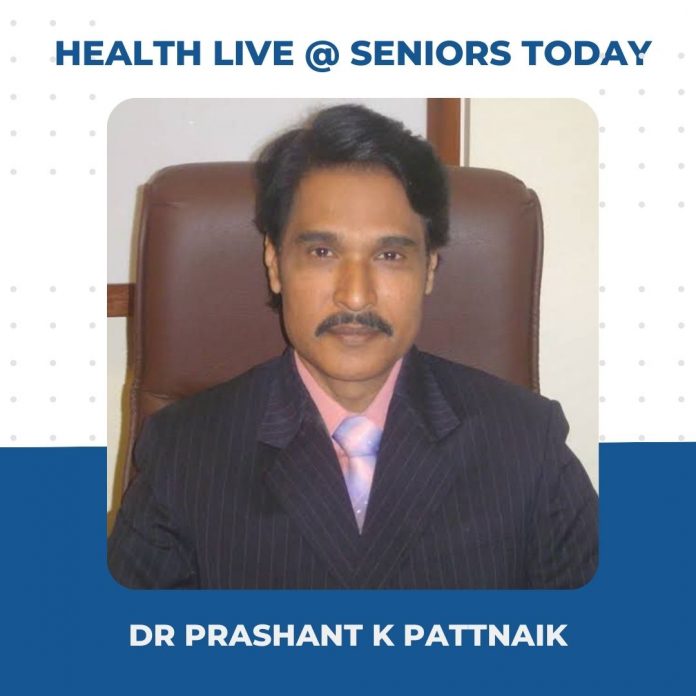On September 12, 2021, Seniors Today hosted its weekly Health Live Webinar. This weekend we had with us a leading urologist, Dr Prashant K Pattnaik who spoke about and answered questions on urological concerns of senior citizens.
Dr Prashant K Pattnaik is leading Urologist with the Wockhardt Hospital in Mumbai. After his MBBS, MS (Surgery) and MCh(Urology) from Mumbai University, he successfully managed the first Lithotripsy centre in India. He has a record number of treating more than 50,000 cases of stone and allied diseases across the country and overseas through Lithotripsy and Endourological procedures.
He was among the first to treat stone patients with pacemakers. A recipient of several awards, he is a member of the Society International Urology, American Urological Association, International endourological Society, European Association of Urology and the Indian Urological Association.
– The incidence of urological problems and issues in the seniors is as high as 40%.
With age, a lot of genetic mutations occur such as cancer and so lots of diseases and urological concerns can occur in the uri art system.
There are also metabolic diseases such as diabetes related kidney disease.
– Lower urinary tract symptoms or LUTS includes infection of the lower urinary tract or obstructive causes can also cause LUTS. These include increased frequency of passing urine, increased frequency of micturition at night, burning or painful middle micturition.
– Urinary tract infections are a very big problem in both the elderly male and female.
– Other commodities such as hypertension and diabetes with ageing make the kidneys more vulnerable to damage.
– If you have to get up more than 8-10 times in the night to pass urine, you should go visit your urologist.
– The prostate gland is a very small gland, almost the size of a walnut, located below the urinary bladder and is a part of the male genitourinary system.
It is a very important organ for sexual health.
20% of the volume of semen is formed in the prostate.
Men should annually get their serum PSA tests done, if it is increased it indicates increased chances of developing prostate cancer or prostatitis.
– Benign Prostate Hyperplasia (BPH)- with age, the prostate increases in size, after the age of 50 it starts growing and by the age of 60 it has increased by 20% and by 80% by the age of 80 years.
It is called benign, since it is non-cancerous. If cancer occurs, then the PSA levels will be increased.
The symptoms include-
- Weak urinary stream
- Dribbling of urine
- Increased frequency and urgency of passing urine
- Urinary incontinence
– Prostatitis is the infection of the prostate glands. If the gland increases in size, it compresses the urethra which leads to difficulty in passing the urine, getting up frequently to pass urine at night.
– If you have a complaint of urinary incontinence, your doctor will try to find out the cause of the symptom. He’ll take a thorough history and do a proper examination and run a few investigations such as serum PSA, urodynamic studies, ultrasonography to find out the cause for the incontinence. Depending on the cause, he will give you the medications and will also advice you some behavioural therapy
– Hydrocoele is a fluid filled sac usually causing an enlargement of the scrotum. It is corrected only by surgical intervention where the fluid is taken out and the sac is left behind.
– Prostatomegaly can be treated by alpha blockers. Shitz bath can provide symptomatic relief in some cases but it is not a definitive treatment for the same. If the individual does not respond well to the medications and continues to have bothersome symptoms, they can consult their doctor and go for a minimally invasive surgery for the same.
– Urogenital tuberculosis is a tuberculosis of the urogenital system that includes the kidney, bladder and/ or the sexual organs. This can cause abscesses and obstructions. It can be treated with anti tubercular drugs and the abscess and obstructions can be treated surgically.



